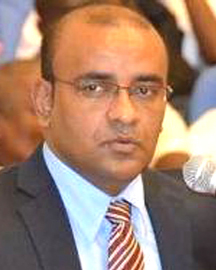Lead Opposition spokesperson on economic issues Carl Greenidge says the fact that former President Bharrat Jagdeo signed into law the Former Presidents (Benefits and Other Facilities) Act 2009 shows how rapacious an administration he led and how contemptuous he is of the Guyanese people given income disparities.
The Parliament last week passed a Motion tabled by Greenidge seeking a revision of the President’s benefits and other facilities. Greenidge is also to bring a Bill to the National Assembly seeking to amend the Former Presidents (Benefits and Other Facilities) Act and will seek to impose caps and limits on those benefits and facilities.

Speaking in an interview with this newspaper last week, Greenidge said that contrary to the points Government Members of Parliament raised during the debate on the Motion two Thursdays ago, there is only one qualification required for entitlement to a Presidential Pension and for the facilities under the Former Presidents (Benefits and Other Facilities) Act. “That requirement is to have served as a President. This means that a former President’s niceness, how he treated his wife etc are not considerations. So the long treatise of the AG and company on how great a President or person Mr. Jagdeo is are all irrelevant,” he said.
“The main concern of the House and most importantly, of the public is that the Constitution specifically provides for a former President to have a pension or a gratuity,” he said. “It makes no provision for additional benefits such as a salary or allowances on top of a pension. No other politician or individual public servant enjoys these additional benefits along with a Pension,” Greenidge pointed out, adding that no other category of officer except Judges receives a pension in excess of their last salary.
Greenidge noted that it is likely that in 2002 the Constitution Reform Committee recognized that the former President’s proposed pension was already generous enough. “For that reason the omission of other benefits and facilities was probably deliberate. In that sense seeking to pay those benefits may be illegal,” he said.
“In spite of this provision in the Constitution, the Government has only now sought to and actually provide for benefits, but has provided benefits which are unlimited. The benefits will be enjoyed throughout the lifetime of a former President. There is no cap on the number of vehicles to which he is entitled, no restriction on the utilities bill, no restrictions regarding medical facilities to be enjoyed by an unspecified number of dependants beyond a spouse,” the former Minister of Finance under the PNC administration said.

“In fact, at a time when the Government says it cannot find funds to pay for more than $10,000 per month to pensioners although the APNU asked for $15,000, a President is being paid a multiple of that for his electricity bill alone. His monthly pension is over 80 times that of a pensioner and seven times the full salary of a Parliamen-tarian and as much as 40 times the pension of some former Ministers,” said Greenidge.
“If the payment received by these other categories is all that the country can afford, how is it that the GOG can pay a Former President over $800,000 per month?” he inquired. He said in addition to these benefits, the former President has been given tax free status “as though he were still a serving President.” He asked why a former President should be able to import a vehicle duty free if that former President is getting however many cars he or she asks from the state for the rest of his or her life.
Greenidge pointed out that in Trinidad and Tobago, the Prime Minister’s benefits are limited and tied to those of public servants. He said also that in the US, personal security will only be provided to a former President for 10 years after he or she demits office. “In the US, all the benefits due to a former President are capped, i.e. there is a ceiling on them. Furthermore, each year the facilities and benefits have to be budgeted, valued, and approved. They cannot be limitless as in Guyana’s loosely drafted statute,” Greenidge argued.





